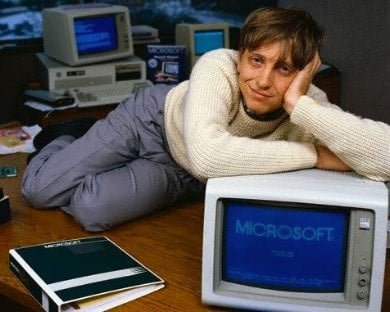Find Our Latest Video Reviews on YouTube!
If you want to stay on top of all of our video reviews of the latest tech, be sure to check out and subscribe to the Gear Live YouTube channel, hosted by Andru Edwards! It’s free!
Monday August 15, 2011 8:50 am
Bill Gates speaks about the past, present, future of the PC

The most significant innovation in personal computing over the last 30 years has been the evolution of natural interfaces, with the GUI, speech recognition, gestures and touch receiving equal weight, according to Bill Gates, a co-founder and the former chief executive of Microsoft.
As the PC turns 30, we asked Gates, as well as other industry leaders, for their thoughts on the most significant innovation in personal computing, and how PCs have changed people's lives for the better – or worse. Finally, we wanted to know what the future holds for personal computing – and maybe whether the "Personal Computer" would exist in its current form.
While Apple's Steve Jobs and Steve Wozniak arguably invented and popularized the personal computer, Bill Gates, Paul Allen and later Steve Ballmer at Microsoft crafted and shaped the Windows operating system which became synonomous with the term "PC". The Apple Macintosh and Windows pushed the graphical user interface into the mainstream, driven by the increasing performance of microprocessors from Intel Corp., and later from chips designed by Advanced Micro Devices, Cyrix, Via Technology, and others.
"The truth of Moore's law has made remarkable things possible," Gates said.
"On the software side, I think natural user interfaces in all their forms are equally significant," Gates added. "We just take it for granted now, but the graphical user interface was an amazing breakthrough that made computers dramatically easier for almost everyone to use. Today, we're seeing speech recognition and speech synthesis technologies coming into the mainstream. Touchscreens on phones, tablets and PCs have opened up an incredible new world of applications. And we've barely scratched the surface with new interfaces such as those in Kinect, which incorporate facial recognition along with gesture-based and voice control."
Gates has evolved much as the PC has: in its infancy, the personal computer was a hobbyist product, and expanded into a consumer device, a business tool, and then an ubiquitous device that has helped shape human culture. In his role as the co-founder of the Bill and Melinda Gates Foundation, Gates has taken his technology and business acumen on the road, using technology as a tool to crack fundamental problems facing humanity: education, poverty, health care, and agricultural research, among others.
It's the role of the PC as a cultural touchstone for which Gates seems most proud. When asked if the PC had changed people's lives for the better, Gates replied, "There's no question that it has."
"The PC has improved the world in just about every area you can think of," Gates said. "Amazing developments in communications, collaboration and efficiencies. New kinds of entertainment and social media. Access to information and the ability to give a voice people who would never have been heard. All of these have their roots in what the PC made possible, amplified and extended by other devices.
"But we're still falling short in some areas," Gates added. "Education is one example, where the impact of technology lags behind almost every other part of society. There's so much more that can be done to utilize technology in engage students, help teachers, and customize learning for each child."
The question now is how the personal computer will evolve. Clearly, the days of the desktop PC are over; in Oct. 2008, laptops began outpacing the sales of desktop PCs, and that trend has continued to accelerate. And phones have made the computing experience even more personal; the addition of GPS chips to phones allowed the phone to provide location-based services, a capability that notebooks simply haven't been able to adequately duplicate.
Computing devices have become gateways to the Internet, Gates said, and will continue to serve that role.
"On a personal level, technology will be more seamlessly integrated into our lives. We see this taking shape now – so many things are becoming available in digital form and are accessible to us wherever and whenever we need it," Gates said.
"On a societal level, technology will contribute to solving many of our greatest challenges," Gates added. "In global health, it will advance scientific discovery, diagnostics, and delivery of health services to the world's poor. In education, it has the potential to ignite student interest in learning and help teachers understand what's working and what's not in the classroom. And in many other areas, including energy and the environment, computers already are and will continue to be an essential tool for data collection, analysis, and innovation."
And what's on the road ahead? Who knows. "The next 30 years are going to be equally remarkable as the last 30," Gates said. "We're really still just at the beginning of what's possible. "
This article, written by Mark Hachman, originally appeared on PCMag.com and is republished on Gear Live with the permission of Ziff Davis, Inc.
Latest Gear Live Videos
Advertisement
Advertisement
Advertisement
© Gear Live Inc. {year} – User-posted content, unless source is quoted, is licensed under a Creative Commons Public Domain License. Gear Live graphics, logos, designs, page headers, button icons, videos, articles, blogs, forums, scripts and other service names are the trademarks of Gear Live Inc.











